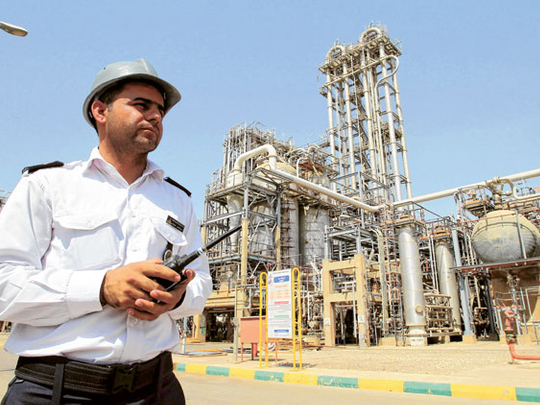
Abu Dhabi: The UAE's oil revenues could get a boost if the country can source enough oil to replace Iranian oil exports to Europe, energy experts have said.
The European Union (EU) plans to halt oil imports from Iran from July 1.
Benchmark Brent crude prices rose to around $111.50 (Dh409.53) a barrel on Friday before a vote in Iran's parliament — which was later postponed — to halt exports to the European Union as early as this week in retaliation for EU plans.
It's widely feared that global crude prices could rise as high as $150 a barrel if the West's tensions with Tehran escalate, dashing any hopes of a quick recovery in the global economy already reeling under the impact of the European sovereign debt crisis.
"The UAE has limited ability to increase production. But if it can find another 100,000 barrels per day for export to Europe, at current prices it could mean an extra $10 million a day in oil export revenues, which is revenue worth having," Robin Mills, head of Consulting at Manaar Energy in Dubai, told Gulf News.
"There's an opportunity for the UAE to increase output and offer to sell that crude to the European Union," he added.
According to the latest figures from Paris-based International Energy Agency (IEA), the UAE on average produced 2.5 million barrels per day of crude oil in 2011, while having a sustainable production capacity of 2.74 million barrels per day.
Iran's parliament drafted legislation calling for the government to halt oil exports to Europe until the European Union cancels its planned ban on the country's crude, Fars News Agency reported, citing a lawmaker.
The bill would also require Iran to embargo imports from countries participating in the EU ban, said Nasser Sodani, the deputy head of the parliament's energy commission.
Last week the EU decided to stop importing Iranian oil but the bloc postponed its ban to give members time to find alternative suppliers.
Iranian officials have since threatened to retaliate by disrupting shipping in the strategic Strait of Hormuz, through which almost a fifth of the world's oil flows. Europe is Iran's No 2 customer after China, taking 450,000 barrels of Iranian crude a day, according to the US Energy Department.
Iran is the second-largest producer in the Organisation of Petroleum Exporting Countries (Opec) after Saudi Arabia, pumping 3.575 million barrels a day of crude in December.
Meanwhile, experts believe Iran's war games in the Gulf are nothing more than a tactical move to strengthen its position ahead of future talks with the West to get the sanctions threatening its oil exports lifted.
"The conflict between the West and Iran over the Islamic Republic's nuclear programme has intensified, with new US and EU sanctions further tightening Iran's financial isolation," wrote London-based energy expert Samuel Ciszuk in a research note to clients.
"If it goes ahead, the proposed EU oil embargo would dislocate Iranian crude flows from Europe to Asia at a time of challenging marketing conditions."
Trade under pressure
Experts say trade with Iran has come under renewed pressure after the United Nations and the United States imposed sanctions against it.
The UAE has followed the UN sanctions against Iran and it applies the US sanctions against the Islamic country through the financial system. Iran primarily was exporting food items, construction materials, petrochemicals, carpets, pistachio nuts, ceramics, appliances and agricultural and industrial products to the UAE. It had been importing gasoline, cars and appliances from the UAE.
Re-export trade between Iran and the UAE totalled Dh19.5 billion in the first six months of 2011, up from Dh14.3 billion a year earlier.












